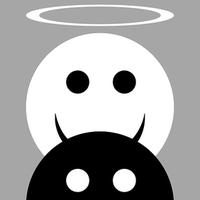Το Χάλοουϊν: καλό ή κακό;
|Хэллоуин|||плохо
das|Halloween|gut|oder|schlecht
|Halloween|||
Halloween: good or bad?
Halloween : bon ou mauvais ?
Хэллоуин: добро или зло?
Halloween: gut oder schlecht?
Είναι το Χάλοουϊν κακό; Δεν πιστεύω κάτι τέτοιο!
|||||||такое
||Halloween|||||
ist|das|Halloween|schlecht|nicht|ich glaube|etwas|solches
|||||||such a thing
Is Halloween bad? I do not believe such a thing!
Halloween est-il mauvais ? Je ne crois pas que ce soit le cas !
Хэллоуин - это зло? Я не думаю, что это так!
Ist Halloween schlecht? Ich glaube nicht!
Οι περισσότεροι άνθρωποι δεν το παίρνουν στα σοβαρά.
||люди|||берут||серьезно
|||||||sérieusement
die|meisten|Menschen|nicht|es|sie nehmen|in|ernst
|most||||take||seriously
Most people don't take it seriously.
La plupart des gens ne le prennent pas au sérieux.
Большинство людей не воспринимают это всерьез.
Die meisten Menschen nehmen es nicht ernst.
Στην πραγματικότητα, αυτή η γιορτή αποτελεί εμπαιγμό του κακού!
|||||является|насмешка||зла
||||||moquerie||mal
in der|Realität|diese|die|Feier|sie stellt dar|Verspottung|des|Bösen
|reality||||"constitutes"|mockery||"evil"
In fact, this celebration is a mockery of evil!
En réalité, cette fête est un affront au mal !
На самом деле, этот праздник является насмешкой над злом!
In Wirklichkeit ist dieses Fest eine Verspottung des Bösen!
Για παράδειγμα, όσον αφορά τις στολές, κατά τη διάρκεια του Μεσαίωνα οι θεολόγοι δίδασκαν πως κάποιος θα μπορούσε να αντισταθεί στους πειρασμούς του διαβόλου αν πληγώθηκε η περηφάνια του.
||что касается|||доспехи|||в течение||Средневековья||богословы|учили||||||устоять||искушениям||дьявола||пострадала||гордость|
||||||||||||théologiens|disaient||||||||tentations||du diable||était blessée||fierté|
für|Beispiel|bezüglich|betrifft|die|Kostüme|während|die|Dauer|des|Mittelalters|die|Theologen|sie lehrten|dass|jemand|wird|er konnte|zu|widerstehen|den|Versuchungen|des|Teufels|wenn|er verletzt wurde|die|Stolz|sein
||"as for"|"regarding"||uniforms|||duration||Middle Ages||theologians|"were teaching"||||||resist||temptations||devil's||was wounded||pride|the
For example, as far as uniforms are concerned, during the Middle Ages theologians taught that one could resist the temptations of the devil if his pride was hurt.
Par exemple, en ce qui concerne les costumes, pendant le Moyen Âge, les théologiens enseignaient qu'on pouvait résister aux tentations du diable si sa fierté était blessée.
Например, что касается костюмов, то во время Средневековья теологи учили, что кто-то может сопротивляться искушениям диавола, если будет затронута его гордость.
Zum Beispiel lehrten im Mittelalter die Theologen, dass man den Versuchungen des Teufels widerstehen könnte, wenn sein Stolz verletzt wurde.
Έτσι, ο διάβολος απεικονιζόταν με κέρατα, ουρά και δίκρανο.
||дьявол|изображался|||хвост||вилы
||diable|était représenté||cornes|||fourchette
so|der|Teufel|er wurde dargestellt|mit|Hörner|Schwanz|und|Dreizack
||the devil|was depicted||horns|tail||pitchfork
Thus, the devil was depicted with horns, a tail and a fork.
Ainsi, le diable était représenté avec des cornes, une queue et une fourche.
Таким образом, дьявол изображался с рогами, хвостом и вилкой.
So wurde der Teufel mit Hörnern, einem Schwanz und einer Gabel dargestellt.
Φυσικά, ο ίδιος δεν τα έχει αυτά τα χαρακτηριστικά, παρόλο που τα παιδιά μεταμφιέζονται με αυτόν τον τρόπο· όπως και μια πραγματική μάγισσα δεν πετάει πάνω σε ένα σκουπόξυλο ούτε φοράει πάντα ένα μυτερό καπέλο και έναν μαύρο μανδύα, για να μην αναφέρουμε τη μακριά μύτη!
||сам|не|||||||хотя|эти|дети|||ним|||как|||настоящая|||||||метла||носит|||м尖|какое|||черное|плащ||||упоминаем||далеко|
|||||||||||||||||||||vraie|||vole||||balai||porte|||pointu|chapeau|||||||||||nez
natürlich|der|er selbst|nicht|die|er hat|diese|die|Merkmale|obwohl|dass|die|Kinder|sie verkleiden sich|mit|ihm|den|Weise|wie|und|eine|echte|Hexe|nicht|sie fliegt|auf|einem|einen||||||spitz|Hut|und|einen|schwarzen|Umhang|um|zu|nicht|wir erwähnen|die|lange|Nase
||||||||characteristics|"even though"||||are disguised||||||||real|||||||broomstick|||always||pointed|||||hat||||mention|||nose
Of course, he does not have these characteristics, although children disguise themselves in this way; like a real witch, he does not fly on a broomstick, nor does he always wear a pointed hat and a black cloak, not to mention the long nose. !
Конечно, у него нет этих характеристик, хотя дети маскируются таким образом; как и настоящая ведьма не летает на метле и не всегда носит остроконечную шляпу и черный плащ, не говоря уже о длинном носе!
Natürlich hat er nicht diese Eigenschaften, obwohl Kinder sich auf diese Weise verkleiden; ebenso fliegt eine echte Hexe nicht auf einem Besen und trägt nicht immer einen spitzen Hut und einen schwarzen Umhang, ganz zu schweigen von der langen Nase!
Τα προαναφερθέντα είναι στερεότυπα.
|упомянутые ранее||стереотипы
|précédemment mentionnés||stéréotypes
die|zuvor genannten|sind|Stereotypen
|previously mentioned||stereotypes
The above are stereotypes.
Вышеупомянутое - это стереотипы.
Die oben genannten sind Stereotypen.
Αντίθετα, ο σατανάς παρουσιάζεται απατηλά ως «άγγελος φωτός» (Β' Κορ 11,14 TGV).
напротив||сатана|представляется|обманчиво||ангел|||Корантянам|Синодальный перевод
||Satan|se présente|trompeusement||||||
im Gegenteil|der|Satan|er erscheint|täuschend|als|Engel|des Lichts|2|Korinther|TGV
On the contrary||Satan|"appears"|deceptively|||||"Corinthians"|NIV
On the contrary, Satan falsely presents himself as an "angel of light" (2 Cor 11:14 TGV).
Напротив, сатана обманчиво предстаёт как «ангел света» (2 Кор 11:14 TGV).
Im Gegensatz dazu erscheint der Satan täuschend als "Engel des Lichts" (2 Kor 11,14 TGV).
Επιπλέον, ο Θεός μέσω του Ιησού «αφαίρεσε τη δύναμη που είχαν» τα «πονηρά πνεύματα», που νικήθηκαν από το «θρίαμβο του σταυρού του Χριστού» (Κολ 2,15· Εφ 6,12 TGV).
||Бог|через||Иисуса|убрал||сила||имели||лукавые|духи||были побеждены|||триумфа||креста||Христа|Колоссянцам||
||||||a enlevé|||||||||ont été vaincus|||triomphe||croix|||||TGV
außerdem|der|Gott|durch|den|Jesus|er nahm weg|die|Kraft|die|sie hatten|die|bösen|Geister|die|sie wurden besiegt|durch|den|Triumph|des|Kreuz|des|Christus|Kolosser|Epheser|TGV
Additionally||||the|Jesus|removed||power||||wicked|spirits||were defeated|||triumph||cross of Christ||Christ's|Col.|Eph|New World Translation
Furthermore, God through Jesus "removed the power that they had" of the "wicked spirits", which were defeated by the "triumph of the cross of Christ" (Col 2,15; Eph 6,12 TGV).
Кроме того, Бог через Иисуса «лишил силы» «злых духов», которые были побеждены «триумфом креста Христова» (Кол 2:15; Еф 6:12 TGV).
Darüber hinaus hat Gott durch Jesus die Macht, die die "bösen Geister" hatten, durch den "Triumph des Kreuzes Christi" (Kol 2,15; Eph 6,12 TGV) entfernt.
Ως εκ τούτου, το Χάλοουϊν δεν γιορτάζει το κακό ‒ στην πραγματικότητα οι χριστιανοί το χλευάζουν!
|из|этого||||празднует||||||христиане||насмехаются
||cela||||||||||||se moquent
als|||das|Halloween|nicht|es feiert|das|Böse|in der|Tat|die|Christen|es|sie verspotten
as||"this"||||||evil||reality||Christians||mock
Therefore, Halloween does not celebrate evil ‒ in fact, Christians mock it!
Следовательно, Хэллоуин не празднует зло - на самом деле, христиане его насмехаются!
Daher feiert Halloween das Böse nicht ‒ tatsächlich verspotten die Christen es!
PAR_TRANS:gpt-4o-mini=2.07 PAR_CWT:AvJ9dfk5=8.73
de:AvJ9dfk5
openai.2025-02-07
ai_request(all=6 err=0.00%) translation(all=11 err=0.00%) cwt(all=170 err=4.12%)

